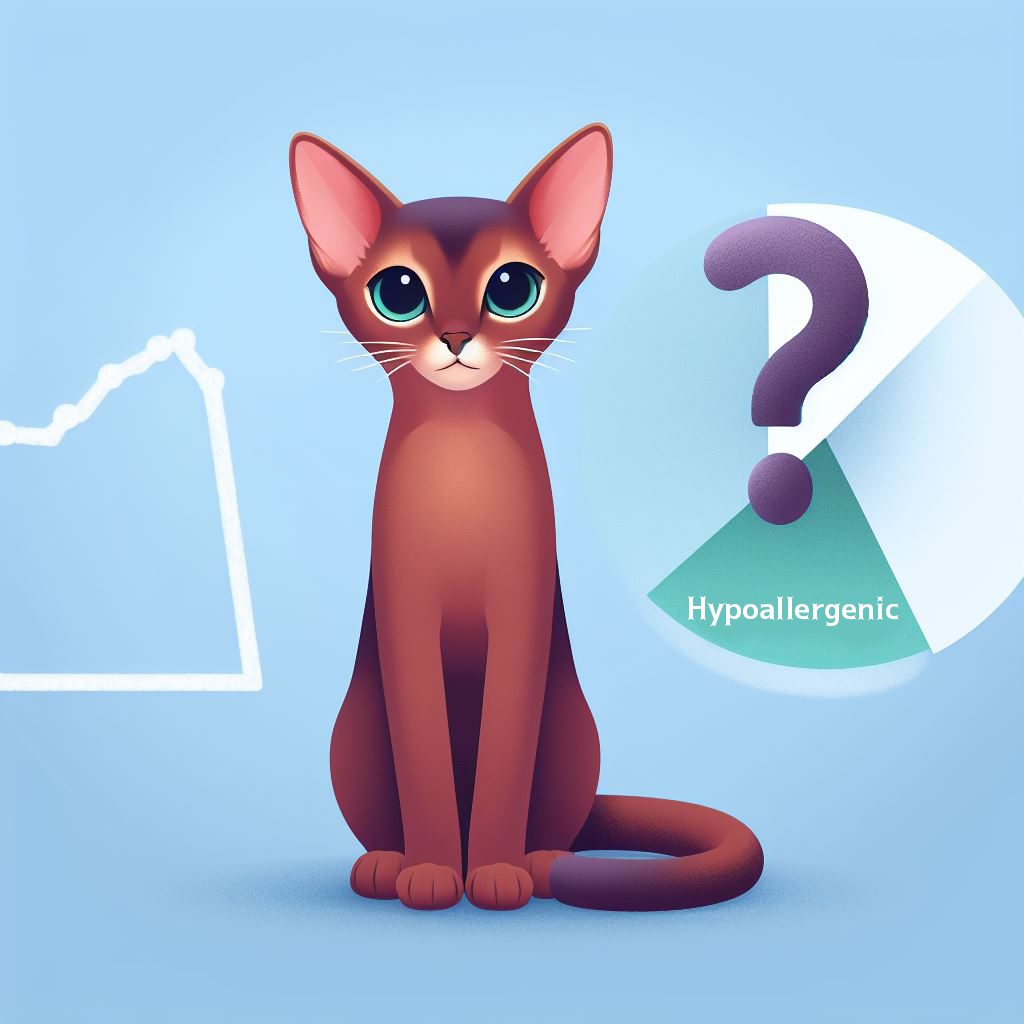Abyssinian cats are a popular breed known for their playful and affectionate nature. However, for people with allergies, owning a cat can be a challenge. Many cat breeds produce allergens, which can trigger allergic reactions in sensitive individuals. This is where the idea of hypoallergenic cat breeds comes in.
While no cat is truly hypoallergenic, some breeds, including Abyssinians, are considered to be more allergy-friendly than others. Abyssinian cats are known for their low dander production, low shedding levels, and lower levels of the Fel d1 protein, which is a common allergen in cats. This means that people with milder cat allergies may be able to tolerate an Abyssinian cat.
If you’re considering getting an Abyssinian cat, it’s important to understand what hypoallergenic really means and what to expect. This article will provide an overview of Abyssinian cats, their hypoallergenic traits, and how they may affect allergy sufferers. We’ll also cover some tips for caring for Abyssinian cats and important medical considerations to keep in mind.
Key Takeaways
- While no cat is truly hypoallergenic, some breeds, including Abyssinians, are considered to be more allergy-friendly than others.
- Abyssinian cats have lower levels of the Fel d1 protein, which is a common allergen in cats, and may be suitable for people with milder cat allergies.
- If you’re considering getting an Abyssinian cat, it’s important to understand their hypoallergenic traits and how they may affect allergy sufferers, as well as to learn about proper care and medical considerations.
Abyssinian Cat Overview
The Abyssinian cat is a medium-sized breed that is known for its distinctive ticked coat, which comes in a range of colors, including ruddy, blue, fawn, and silver. They have a lean and muscular build, with long legs and a wedge-shaped head. These cats have large ears and almond-shaped eyes that are usually green or gold.
Abyssinian cats are known for their friendly and outgoing personality. They are intelligent and curious, and they love to play and explore. They are also very active and need plenty of exercise and mental stimulation to stay happy and healthy.
While Abyssinian cats are not hypoallergenic, they are considered to be a good choice for people with allergies. This is because they produce less of the Fel d 1 protein, which is the primary allergen found in cat dander. However, it’s important to note that no cat breed is completely hypoallergenic, and some people may still experience allergic reactions to Abyssinian cats.
In terms of grooming, Abyssinian cats have short, fine coats that require minimal maintenance. They should be brushed regularly to remove dead hair and keep their coat shiny and healthy. It’s also important to keep their teeth clean by brushing them regularly and providing them with appropriate toys and chews to help prevent dental problems.
Hypoallergenic Traits
Abyssinian cats are a popular breed of domestic cats known for their playful, outgoing, and curious nature. However, many people are allergic to cats and may experience allergic reactions such as sneezing, runny nose, and itchy eyes. In this section, we will discuss the hypoallergenic traits of Abyssinian cats.
It is important to note that no cat breed is 100% hypoallergenic, and Abyssinian cats are no exception. However, they produce fewer allergens than other cat breeds, which makes them a good choice for people with mild to moderate cat allergies.
Abyssinian cats have short, fine coats that shed very little, which means they produce fewer allergens. Additionally, they groom themselves frequently, which helps to remove loose hair and dander from their coat. This reduces the amount of allergens that are released into the air and can help to reduce the severity of allergic reactions.

Another hypoallergenic trait of Abyssinian cats is that they produce less of the protein Fel d 1, which is the primary allergen found in cat saliva, urine, and dander. This protein is responsible for triggering allergic reactions in many people, and the fact that Abyssinian cats produce less of it can make them a good choice for people with cat allergies.
Allergens and Abyssinian Cats
Abyssinian cats are often considered as a hypoallergenic breed, meaning that they produce fewer allergens than other cat breeds. However, it is important to note that no cat breed is completely hypoallergenic, and some people may still experience allergic reactions to Abyssinian cats.
Fel D 1 Protein
One of the main allergens associated with cats is the Fel D 1 protein, which is found in their saliva and skin glands. When cats groom themselves, they spread this protein throughout their fur, which can then become airborne and trigger allergic reactions in susceptible individuals.
Studies have shown that Abyssinian cats produce lower levels of Fel D 1 protein than other cat breeds, which may make them a better choice for people with cat allergies. However, it is important to note that even low levels of Fel D 1 protein can still cause allergic reactions in some people.
Saliva and Dander
In addition to Fel D 1 protein, cat allergies can also be triggered by other components of their saliva and skin cells, such as dander. Dander is made up of tiny flakes of dead skin that cats shed regularly, and it can become airborne and spread throughout the home.
Abyssinian cats are known for producing less dander than other cat breeds, which may make them a good choice for people with mild cat allergies. However, it is important to note that even low levels of dander can still cause allergic reactions in some people.
Overall, while Abyssinian cats may produce fewer allergens than other cat breeds, it is important for people with cat allergies to spend time with an Abyssinian cat before bringing one into their home. This can help determine whether or not they will experience allergic reactions to the cat.
Abyssinian Cats and Allergy Sufferers
Abyssinian cats are a popular breed due to their unique appearance and playful personalities. However, for people with cat allergies, owning a cat can be a challenge. While no cat breed is completely hypoallergenic, some breeds produce fewer allergens than others. Abyssinian cats are one such breed that may be a good option for those with milder cat allergies.
Abyssinian cats have lower dander production, low shedding levels, and lower Fel d1 production levels. Fel d1 is a protein that is found in cat saliva and skin glands and is a common allergen for people with cat allergies. Due to their lower levels of this protein, Abyssinian cats may be less likely to trigger allergies than other breeds.
It is important to note that while Abyssinian cats may be a good option for some allergy sufferers, they are not completely hypoallergenic. As The Spruce Pets points out, no cat breed is completely allergen-free. Additionally, different people may have varying levels of sensitivity to cat allergens, so what works for one person may not work for another.
Overall, Abyssinian cats may be a good option for people with milder cat allergies who are looking for a playful and affectionate feline companion. However, it is important to consult with a doctor or allergist before bringing any pet into the home, especially if someone in the household has severe cat allergies.
Caring for Abyssinian Cats
Abyssinian cats are known for their loyalty, intelligence, and energy. They are relatively easy to care for and don’t require a lot of grooming. However, there are still some things to keep in mind when it comes to caring for your Abyssinian cat.
Grooming
Abyssinian cats have short, fine hair that doesn’t mat easily. They don’t require frequent bathing, but regular brushing can help reduce shedding and keep their coat shiny. A soft-bristled brush or rubber curry comb can be used to groom your Abyssinian cat. It’s also important to trim their nails regularly to avoid them getting too long and causing discomfort.
Diet
Abyssinian cats are carnivores and require a diet that is rich in protein. High-quality dry or wet cat food can provide the necessary nutrients for your Abyssinian cat. It’s important to avoid overfeeding your cat, as obesity can lead to health problems. Fresh water should be provided at all times.
Overall, caring for an Abyssinian cat is relatively easy. Regular grooming and a balanced diet can help keep your cat healthy and happy.
Medical Considerations
When it comes to allergies, it’s important to note that no cat breed is entirely hypoallergenic. However, Abyssinian cats are known to produce fewer allergens than other breeds, which may make them a suitable option for people who suffer from allergies.
One of the primary allergens produced by cats is the Fel d1 protein, which is found in their saliva and skin. Abyssinian cats produce less of this protein than other breeds, which can make them a better option for people with allergies.
It’s important to note that while Abyssinian cats may produce fewer allergens, they can still cause allergies in some people. If you’re considering getting an Abyssinian cat but suffer from allergies, it’s important to spend time with the cat before bringing them home to see if you have any reactions.
In addition to allergies, there are other medical considerations to keep in mind when it comes to Abyssinian cats. Like all cats, they require regular veterinary check-ups to ensure they’re healthy and to catch any potential health issues early on.
Abyssinian cats are generally healthy, but they can be prone to certain health issues. These can include dental problems, urinary tract issues, and eye problems. Regular veterinary check-ups can help catch these issues early on and ensure that your cat remains healthy.
Overall, Abyssinian cats can make great pets for people who suffer from allergies. While they’re not entirely hypoallergenic, they produce fewer allergens than other breeds, which can make them a more suitable option for people who suffer from allergies. Additionally, they’re generally healthy cats, but regular veterinary check-ups are still important to ensure they remain healthy.
Conclusion
Abyssinian cats are a popular breed of domestic cat known for their slender bodies, long legs, and short fine coats. They have a distinctive appearance, unique personality, and mysterious origin. However, many people wonder if they are hypoallergenic.
There is no such thing as a completely hypoallergenic cat. Even though Abyssinian cats have short, fine coats, they still produce allergens that can cause allergic reactions in some people.
Despite this, some people with cat allergies have reported that they have less severe reactions to Abyssinian cats compared to other breeds. This is because Abyssinian cats produce fewer allergens than other breeds due to their short, fine coats.
It is important to note that each person’s allergies are unique, and what works for one person may not work for another. If you are considering adopting an Abyssinian cat and have allergies, it is recommended that you spend time with the cat before making a decision. This will give you a chance to see how your body reacts to the cat and determine if it is a good fit for you.
Overall, while Abyssinian cats are not completely hypoallergenic, they may be a good option for people with mild cat allergies. It is important to consult with a doctor or allergist before bringing any pet into your home if you have allergies.
Frequently Asked Questions
What’s the most hypoallergenic cat breed?
There is no such thing as a completely hypoallergenic cat breed. However, some breeds are known to produce fewer allergens than others. These include the Sphynx, Devon Rex, and Siberian cats.
Do Abyssinian cats shed a lot?
Abyssinian cats have short, fine coats that shed minimally. However, they do require regular grooming to keep their coats shiny and healthy.
What is the lifespan of an Abyssinian cat?
Abyssinian cats have a lifespan of 9 to 12 years on average. With proper care and nutrition, they can live up to 15 years.
What are the personality traits of Abyssinian cats?
Abyssinian cats are known for their energetic and playful personalities. They are intelligent, curious, and affectionate with their owners. They enjoy being around people and thrive on attention.
What are the different colors of Abyssinian cats?
Abyssinian cats come in several colors, including ruddy, red, blue, and fawn. They may also have silver, chocolate, or lilac tones in their coats.
Are Abyssinian cats good for people with allergies?
While no cat breed is completely hypoallergenic, Abyssinian cats are known to produce fewer allergens than other breeds. However, it’s important to note that individual reactions to cats can vary, and some people may still experience allergy symptoms around Abyssinian cats.
Conclusion
In conclusion, Abyssinian cats are a popular breed known for their playful and outgoing personality. While no cat breed is 100% hypoallergenic, Abyssinians produce fewer allergens, shed less, and have lower levels of the protein Fel d1, making them a potentially better choice for people with mild to moderate cat allergies.
However, individual reactions can vary, so it’s always advisable for individuals with allergies to spend some time with the cat before deciding to bring it home. Regular grooming and a balanced diet are crucial for Abyssinian cats’ health, and regular vet check-ups are essential to detect any potential health issues. Despite their hypoallergenic traits, consulting with a doctor or allergist is crucial before bringing any pet into a home where allergies are a concern.











































